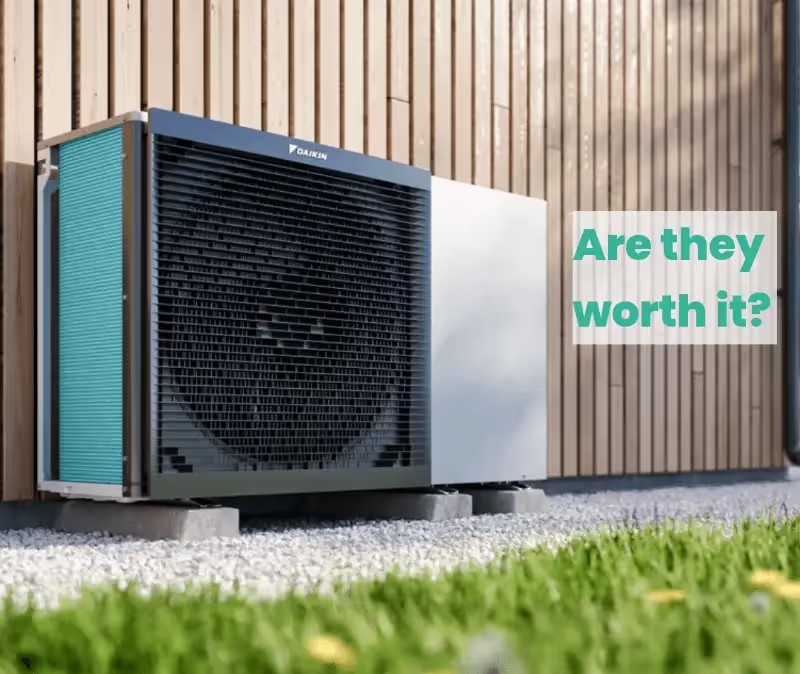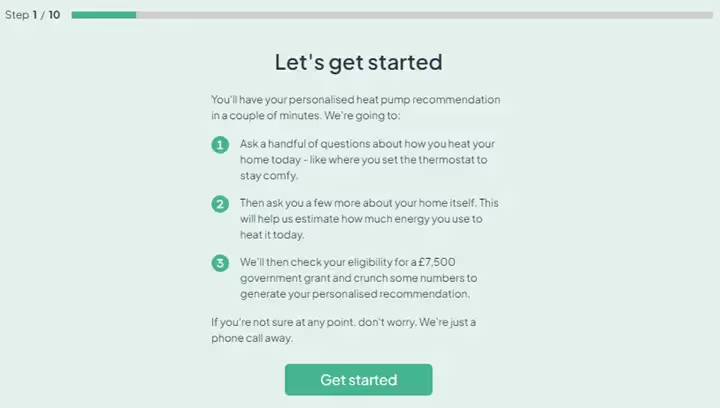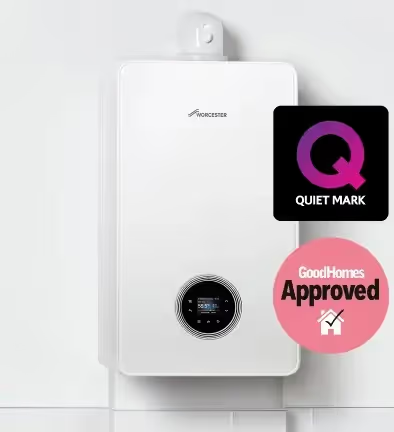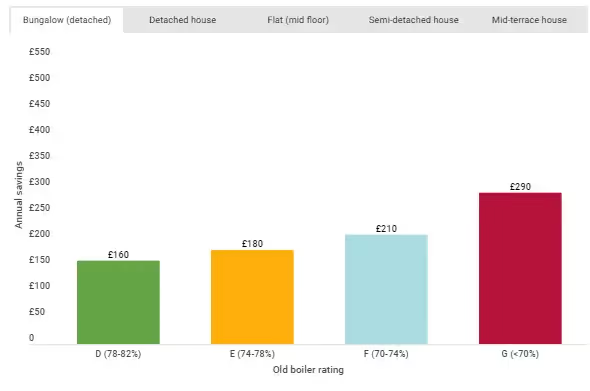
Not got time to read this page in full? Bookmark it for later, and read this quick overview instead…
As air source heat pumps use a reasonable amount of electricity, it makes sense to couple them with solar panels, and a battery as well (if budget allows). By doing so, you’ll be able to generate electricity to help contribute to the power your heat pump needs for most months of the year. In winter the solar generation will be much less, but your battery could store energy from the grid a off peak prices to be used later when the heat pump needs it.
Heat pumps work at much lower flow temperatures than gas boilers. To make your investment worth it, your property will need to have some or all of the following:
Installation costs for heat pumps are comparable to gas boilers when accounting for the Boiler Upgrade Scheme grant.
A typical gas boiler replacement will cost £3,000, whereas a pump is likely to set you back £10,000. However, using the Boiler Upgrade Scheme (£7,500 in funding), you’ll only pay £2,500 on average.

Efficiency is where heat pumps really shine. A new A-rated gas boiler will only operate at 94% efficiency, whereas a typical heat pump will operate at 300% or higher. Coupled with solar panels and batteries, this could slash your energy bills by up to £1,342 a year (as per this Guardian article using a 3 bed semi detached house as an example).
Running costs for a new A-rated boiler are comparable to a heat pump. However, if you’re using something like an old G-rated boiler running on LPG, you could save up to £650 per year.
Still not sure if investing in an air source heat pump is worth it? Use our clickable tool here to determine if it is and how much installation is likely to cost for your property.
Whilst heat pumps do consume a reasonable amount of electricity, they’re incredibly efficient.
For example, our review of the Vaillant aroTHERM shows efficiency levels of up to 503% when conditions are optimal; the aroTHERM uses just 1kWh of electricity to produce up to 5.03kWh of heat!
The problem here is that gas is much cheaper than electricity, so even though gas boilers are less efficient, they still don’t cost much more to run.
The more inefficient your boiler is, the more you’ll save by using a heat pump. Here are a couple of figures from the Energy Saving Trust:
The biggest savings come by combining your heat pump with solar panels. If you use an old G-rated boiler, by switching to a heat pump you’ll save approximately £300, and these savings would increase with solar panels! (ref: Guardian)
The average property in the UK is going to use a 3.5-4kW solar panel system. According to Energy Saving Trust a 3.5kW system can save you approximately £600 per year, a system of this size would cost circa £5,000. By using the electricity generated by solar panels to power your air source heat pump, you'll see a payback period in the region of 8-9 years on the solar system and a further 6 years on the heat pump (assuming a £11,500 install cost with a £7,500 BUS Grant contribution).
The payback period will vary depending on factors such as:
Get more specific estimates on potential savings by using our heat pump tool here.

You'll find that most manufacturers have a range of different heat pumps, suited to different properties; heat pumps are worth buying if you can find a suitable unit for your property.
If you jump over to our guide covering the best air source heat pumps you'll see we list the:
But, heat pump installations become even more worthwhile for properties that have all or some of the following:
Heat pumps work at much lower flow temperatures than gas boilers. For your investment to be worth it, it’s worth upgrading to much larger radiators so your heat pump can work “low and slow”.
A gas boiler will run at a flow temperature of 60°C or higher whereas a heat pump will run at around 40°C-50°C.
Each degree increase in flow temperature results in decreased efficiency. By using larger radiators (bigger surface area but heated to a lower temperature), you’ll see improvements in efficiency and a reduction in your utility bills.
Underfloor heating works in a similar way to a heat pump, working “low and slow” rather than at full-tilt.
If your property has underfloor heating rather than radiators, you’ll see a huge bump in efficiency from your heat pump and therefore, a big reduction in your energy bills.
Properties with high-grade insulation work best with heat pumps. If your property has high quality insulation (usually found in new-builds), a heat pump is going to be worth it; your property will be able to retain heat generated by your pump!

The best way to decide if an air source heat pump is worth it, is to directly compare it to a gas boiler.
Expect a new A-rated boiler for the average property to cost in the region of £3,000. This would get you a quality unit from one of the most reliable boiler brands such as: Worcester, Vaillant, Ideal or Alpha.
In comparison, a typical air source heat pump installation will cost around £10,000. However, it’s worth mentioning that there are heat pump grants available from the UK government.
The most commonly used government grant? The Boiler Upgrade Scheme. You’ll have access to £7,500 funding, bringing the total cost of installation for your heat pump down to £2,500; cheaper than a gas boiler!
You can read our detailed guide covering heat pump installation costs here, or, jump over to our clickable tool to get fixed prices on-screen for your heat pump.
The next thing to determine before deciding if a heat pump is worth it, is exactly how efficient they are.
We’ve written guides covering the efficiency of both gas boilers and heat pumps:
When buying a new boiler, you'll want an A-rated one…
The majority of new boilers from leading brands such as Viessmann, Worcester Bosch, Ideal Heating and Vaillant are A-rated. This will get you a boiler that works at around 94% efficiency; it will consume 1kWh of gas for every 0.94kWh of heat it produces.
Air source heat pumps are much more efficient. Our shortlist shows that the top 8 most efficient units work at anywhere between 3.22-3.96 SCOP. In short, that's 322%-396% efficiency, or, they use 1kWh of electricity for every 3.22-3.96kWh of heat they produce.
The disparity between their efficiency levels only increase for those properties using older boilers, as their efficiency won’t be anywhere near 94%, as you can see from this graphic produced by the Energy Saving Trust:

A new A-rated gas boiler is on-par with an air source heat pump in terms of running costs. If you have anything but an A-rated boiler, investing in a heat pump is worth it; you’ll see huge savings when it comes to your utility bills.
As an example, a G-rated boiler will work at around 70% efficiency; not at the 94% of an A-rated boiler. By switching to an air source heat pump from your old and unreliable G-rated boiler, you should expect to increase the energy efficiency of the heating system by well over 300%.
If you have a G-rated boiler, but it runs LPG, these savings spike to a massive £650 per year on average.
In summary, if you have an A-rated boiler in a well insulated house, expect your energy bills to stay the same.
If you have an old and inefficient boiler (gas, oil, LPG) or even electric storage heaters, upgrading to an air source heat pump is absolutely worth it!
Get your fixed price on-screen for your heat pump using our clickable tool here.
Try our free quote tool. You'll have your personalised quote in under a minute.